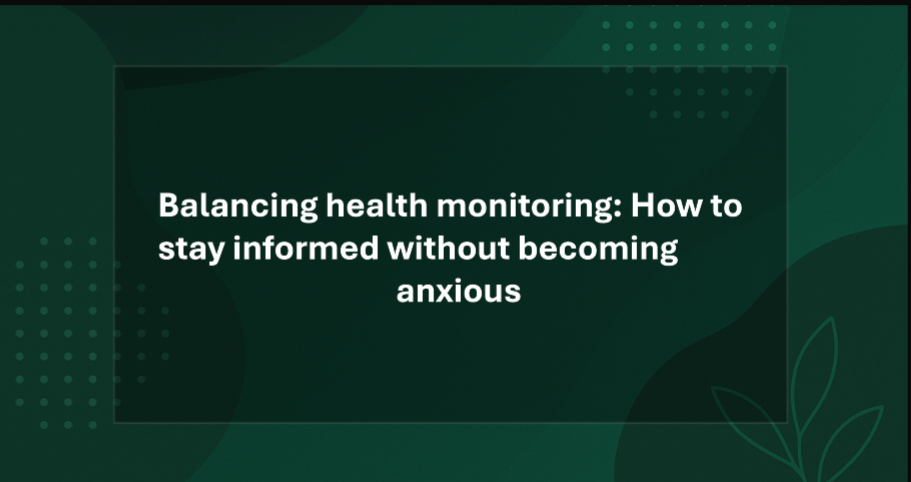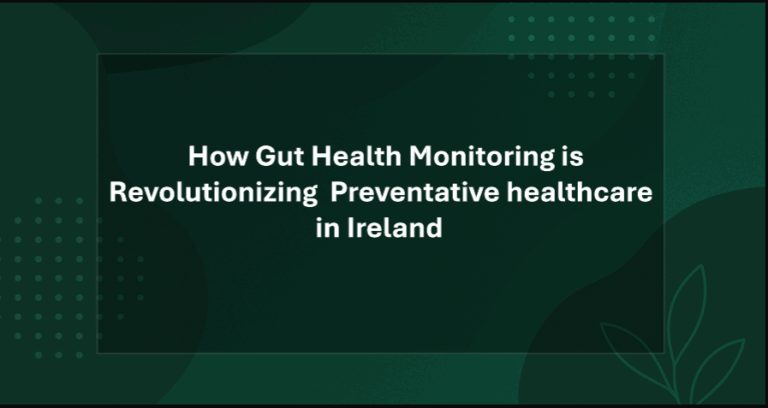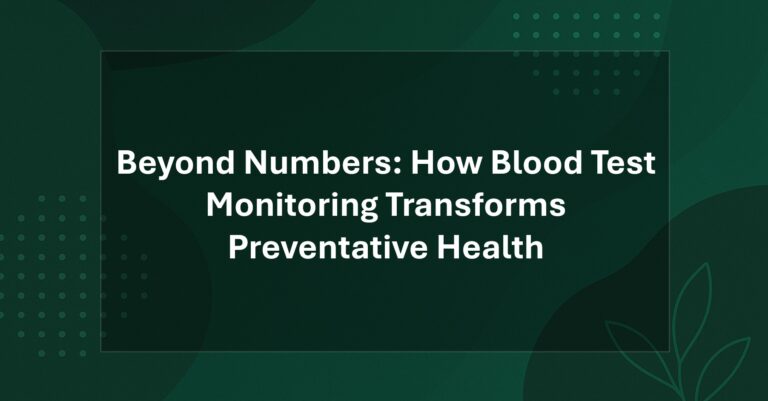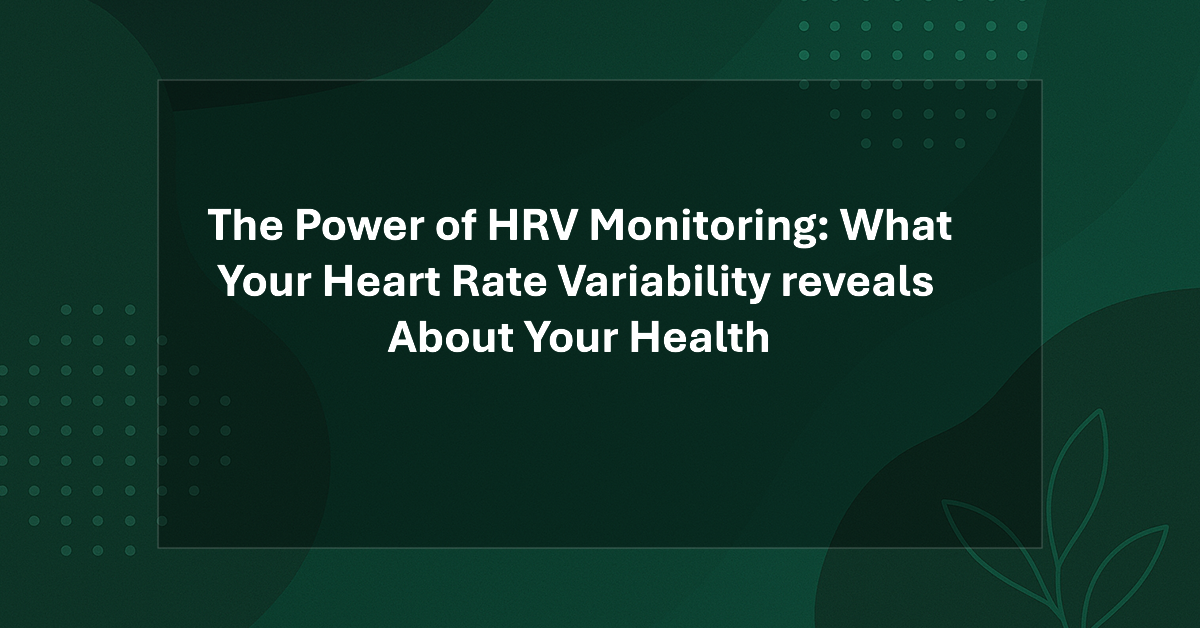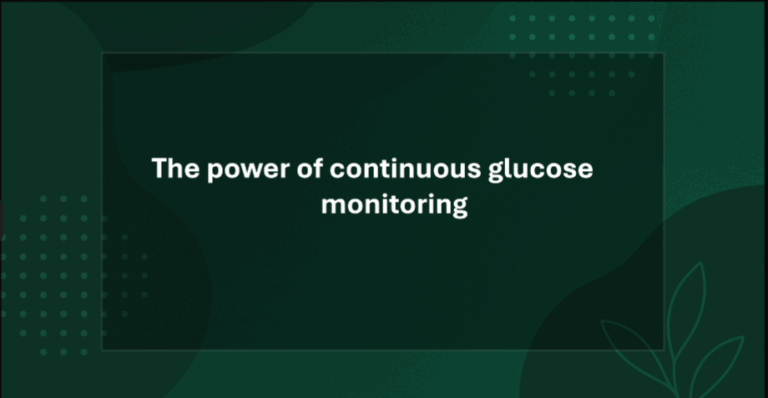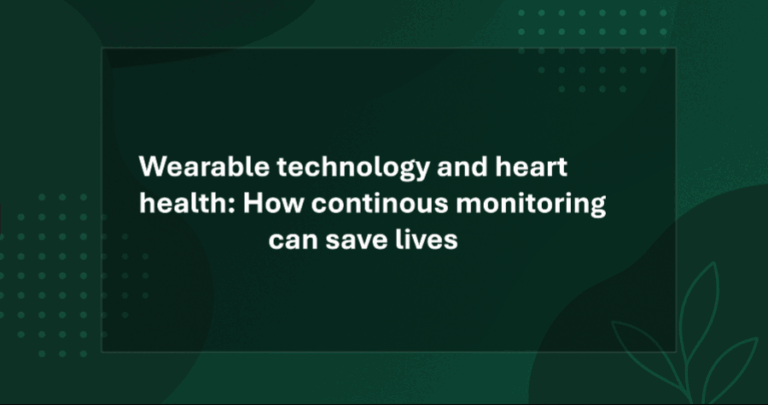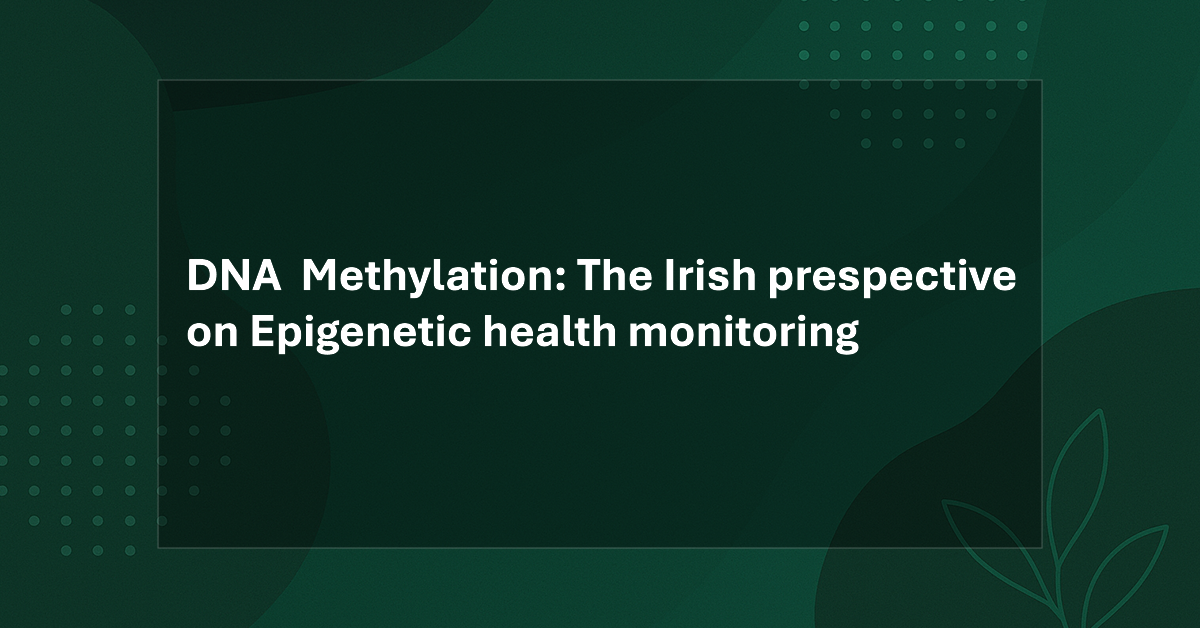Balancing Health Monitoring: How to Stay Informed Without Becoming Anxious
In our increasingly data-driven world, health monitoring technologies offer unprecedented insights into our physical wellbeing. From wearable devices tracking heart rate and sleep patterns to regular blood tests revealing internal biomarkers, we now have access to more health data than ever before. While this information can be empowering, it can also become overwhelming, potentially leading to anxiety rather than improved health outcomes.
This balance is particularly relevant in Ireland, where health anxiety affects approximately 12% of the population according to research from the Irish Health Survey (1). As health monitoring technologies become more accessible, finding the sweet spot between informed vigilance and excessive worry is essential for truly optimising wellbeing.
The Rise of Health Monitoring in Ireland
The adoption of health monitoring technologies has grown significantly in Ireland over the past decade. According to data from the Central Statistics Office, approximately 38% of Irish adults now use some form of health tracking technology, from smartwatches to dedicated medical devices (2). This represents a 156% increase since 2018, reflecting both greater accessibility of these technologies and increased interest in preventative health approaches.
This trend has been further accelerated by the COVID-19 pandemic, which heightened health awareness and normalised regular monitoring of health metrics. A study from University College Dublin found that 43% of Irish adults reported paying more attention to their health data since the pandemic began (3).
While this increased engagement with health information can lead to improved outcomes, it also creates new challenges. The same UCD study found that 27% of respondents reported feeling anxious about health data at least once weekly, with 8% experiencing daily anxiety related to health metrics (3).
Understanding Health Anxiety in the Monitoring Context
Health anxiety exists on a spectrum, from appropriate concern about genuine symptoms to debilitating worry that persists despite medical reassurance. In the context of health monitoring, several specific patterns have been identified:
Data Obsession
Constant checking of health metrics beyond what is necessary or recommended can indicate problematic health anxiety. Research from Trinity College Dublin’s Department of Psychology found that individuals who checked health tracking apps more than 10 times daily were three times more likely to report anxiety symptoms compared to those who checked less frequently (4).
Dr. Siobhan Murphy, Clinical Psychologist at St. Patrick’s Mental Health Services in Dublin, explains: “There’s a tipping point where monitoring shifts from being informative to being compulsive. When checking health data begins to interfere with daily activities or causes significant distress, it’s no longer serving its intended purpose” (5).
Catastrophic Interpretation
Minor fluctuations in health metrics are normal and often meaningless, but those with health anxiety tend to interpret these variations as signs of serious illness. A study from the Royal College of Surgeons in Ireland found that individuals with high health anxiety were 4.7 times more likely to interpret normal biological variations as pathological compared to those with low health anxiety (6).
Reassurance Seeking
Repeatedly seeking medical reassurance despite professional opinions is another hallmark of health anxiety. Research from the Irish College of General Practitioners found that patients with health anxiety consulted their GPs 2.8 times more frequently than the general population, often bringing health tracking data as evidence of suspected problems (7).
The Irish Context: Cultural Factors Influencing Health Anxiety
Several factors specific to the Irish context influence how health monitoring may contribute to anxiety:
Healthcare Access Concerns
Ireland’s two-tier healthcare system, with both public and private options, creates disparities in access to specialist care. Research from the Economic and Social Research Institute found that concerns about healthcare access were associated with a 37% increase in health anxiety symptoms among Irish adults (8).
When combined with extensive health monitoring data, these access concerns can amplify anxiety, as individuals may worry about potential issues they’ve identified through monitoring but face barriers to obtaining prompt medical assessment.
Historical Context
Ireland’s historical experience with healthcare challenges, including the cervical check scandal and long waiting lists for certain services, has created a cultural context where some degree of medical vigilance is considered prudent. A national survey found that 41% of Irish adults expressed some distrust in healthcare systems, potentially increasing reliance on personal health monitoring (9).
Digital Literacy Variations
While Ireland has high overall digital literacy, significant variations exist across age groups and socioeconomic backgrounds. Research from Age Action Ireland found that older adults were more likely to misinterpret health monitoring data, potentially leading to unnecessary anxiety (10).
Finding the Balance: Evidence-Based Approaches
Research suggests several strategies for maintaining a healthy relationship with health monitoring:
Establish Purposeful Monitoring Routines
Rather than constant checking, establishing specific times for reviewing health data can prevent monitoring from becoming obsessive. A study from the School of Public Health at University College Cork found that participants who scheduled specific times to review health data reported 43% less monitoring-related anxiety than those who checked sporadically throughout the day (11).
Dr. Aoife O’Sullivan, Health Psychologist at Cork University Hospital, recommends: “Set aside dedicated time, perhaps weekly, to review your health data thoughtfully. This prevents the constant checking that can fuel anxiety while still allowing you to benefit from the insights monitoring provides” (12).
Understand Personal Baselines and Variations
Education about normal biological variations is crucial for preventing misinterpretation of health data. Research from the Irish Heart Foundation’s Digital Health Programme demonstrated that participants who received education about normal heart rate variations were 67% less likely to experience anxiety when observing fluctuations in their monitoring data (13).
It’s important to recognise that “normal” varies significantly between individuals. A study from the Irish Longitudinal Study on Ageing (TILDA) found that heart rate variability, sleep patterns, and even blood biomarkers show substantial individual differences that remain consistent over time (14). Understanding your personal baseline is more valuable than comparing to population averages.
Practice Informed Interpretation
Learning to interpret health data appropriately is essential for preventing anxiety. A programme developed by the Health Service Executive (HSE) found that participants who received training in data interpretation reported a 52% reduction in health-related worry despite no reduction in monitoring frequency (15).
Key principles of informed interpretation include:
– Focusing on trends rather than isolated readings – Understanding the accuracy limitations of consumer devices – Recognising that correlation doesn’t imply causation – Considering contextual factors that influence readings
Integrate Professional Guidance
Healthcare professionals play a crucial role in helping individuals interpret and respond to health monitoring data appropriately. Research from the Irish Medical Council found that patients who regularly discussed their health monitoring data with healthcare providers reported 61% less anxiety about their findings compared to those who interpreted data independently (16).
Dr. Michael Ryan, a GP based in Galway, suggests: “Bring your health monitoring data to regular check-ups, but avoid seeking urgent appointments for minor variations. This allows for professional interpretation without reinforcing anxiety patterns” (17).
Special Considerations for Vulnerable Groups
Certain populations may need additional support to maintain a healthy relationship with health monitoring:
Those with Pre-existing Anxiety
For individuals with diagnosed anxiety disorders, health monitoring requires careful consideration. Research from the Anxiety Disorders Programme at St. Patrick’s Mental Health Services found that 68% of patients with generalised anxiety disorder reported that health tracking exacerbated their symptoms initially (18).
However, the same study found that with appropriate therapeutic support, 73% of these individuals eventually developed a healthy relationship with monitoring that actually reduced overall anxiety by providing objective data to counter catastrophic thinking (18).
Individuals with Chronic Conditions
Those managing chronic health conditions often benefit significantly from monitoring but may also experience heightened anxiety. A study from Diabetes Ireland found that people with Type 1 diabetes who used continuous glucose monitors reported better clinical outcomes but 31% experienced monitoring-related distress at least monthly (19).
Structured education programmes that address both the technical and psychological aspects of monitoring have shown promise. The DAFNE (Dose Adjustment For Normal Eating) programme, which includes psychological components alongside technical training, reduced monitoring-related distress by 47% among Irish participants (20).
Older Adults
Ireland’s ageing population presents unique considerations for health monitoring. Research from The Irish Longitudinal Study on Ageing found that adults over 65 were more likely to experience anxiety related to health technology compared to younger cohorts, but also showed greater improvements in actual health behaviours when supported appropriately (21).
Age Action Ireland has developed specific guidelines for introducing health monitoring to older adults, emphasising gradual implementation, simplified data presentation, and regular support from healthcare providers or family members (22).
Digital Wellbeing Features: Technology Solutions
Technology itself can help mitigate the anxiety it sometimes creates. Several features have shown promise in research:
Contextual Alerts
Rather than presenting raw data that requires interpretation, some advanced monitoring systems now provide contextual information. Research from the ADAPT Centre at Trinity College Dublin found that users who received contextualised alerts (e.g., “Your heart rate is elevated, which is normal during exercise” rather than simply “Heart rate: 155 BPM”) reported 58% less anxiety when reviewing health data (23).
Trend-Focused Displays
Interfaces that emphasise long-term trends rather than moment-to-moment fluctuations can reduce anxiety while still providing valuable insights. A study from the Human Factors Research Group at University College Cork found that users of trend-focused interfaces were 43% less likely to become fixated on minor variations compared to those using interfaces that highlighted immediate readings (24).
Mindfulness Integration
Some health monitoring platforms now incorporate mindfulness features specifically designed to counter potential anxiety. Research from the Irish Institute of Mental Health Sciences found that brief mindfulness exercises integrated into health monitoring apps reduced anxiety scores by 37% among regular users (25).
The Role of Healthcare Providers
Healthcare professionals play a crucial role in helping patients navigate the complex landscape of health monitoring:
Education and Guidance
Proactive education about appropriate monitoring practices can prevent problems before they develop. The Irish College of General Practitioners has developed guidelines for discussing health monitoring with patients, emphasising realistic expectations and appropriate interpretation (26).
Dr. Niamh O’Connor, a Dublin-based GP, notes: “I now proactively discuss monitoring practices with patients who use health tracking technology, helping them understand what’s worth paying attention to and what’s normal variation. This preventative approach has significantly reduced anxiety-related consultations” (27).
Validating Concerns While Providing Perspective
When patients do experience anxiety related to health monitoring, validation combined with education is more effective than dismissal. Research from the Department of Psychology at University College Dublin found that patients whose concerns were acknowledged before being contextualised were 3.2 times more likely to report reduced anxiety compared to those whose concerns were simply dismissed (28).
Recommending Appropriate Monitoring Practices
Healthcare providers can help patients develop monitoring routines that provide valuable information without fuelling anxiety. The Irish Heart Foundation recommends that providers create individualised monitoring plans that specify which metrics to track, how frequently to check them, and when to seek medical attention (29).
The Future of Balanced Health Monitoring in Ireland
As health monitoring technology continues to evolve, several promising developments may help promote a healthier relationship with health data:
AI-Assisted Interpretation
Artificial intelligence systems are being developed to help interpret health data, flagging genuinely concerning patterns while providing reassurance about normal variations. Research from the Insight Centre for Data Analytics at NUI Galway has demonstrated that AI-assisted interpretation reduced false alarm rates by 73% compared to user interpretation alone (30).
Integrated Mental Health Support
Next-generation health monitoring platforms are beginning to incorporate features that actively support mental wellbeing alongside physical health tracking. The HSE’s Digital Mental Health Strategy includes plans for integrated systems that monitor for signs of health anxiety and provide appropriate support (31).
Community-Based Approaches
Group-based education and support programmes have shown promise in promoting healthy monitoring practices. A pilot programme in community health centres across Ireland found that participants in group education sessions about health monitoring reported 47% less monitoring-related anxiety compared to those who received only written information (32).
Conclusion
Health monitoring technologies offer tremendous potential for improving health outcomes through early detection and personalised insights. However, realising these benefits requires maintaining a balanced approach that prevents monitoring from becoming a source of anxiety rather than empowerment.
For Irish adults navigating this complex landscape, the key lies in purposeful monitoring routines, educated interpretation, appropriate professional guidance, and technologies designed with psychological wellbeing in mind. By approaching health monitoring mindfully, we can harness its benefits while avoiding the pitfalls of excessive worry.
The goal is not to monitor less, but to monitor more wisely—using technology as a tool for genuine health improvement rather than a source of unnecessary concern. With appropriate education, support, and technological design, health monitoring can fulfil its promise of empowering individuals to take control of their health without sacrificing their peace of mind.
*This article is based on peer-reviewed research and represents the current scientific understanding of health monitoring and anxiety. Always consult with healthcare professionals regarding your specific health needs.*
**References:** 1. Central Statistics Office. (2023). Irish Health Survey: Mental health and wellbeing findings. 2. Central Statistics Office. (2024). Technology adoption in healthcare: National survey results. 3. University College Dublin School of Public Health. (2023). Health monitoring behaviours post-pandemic: A national survey. 4. Department of Psychology, Trinity College Dublin. (2023). Frequency of health app checking and anxiety outcomes: A correlational study. Irish Journal of Psychological Medicine, 40(2), 145-153. 5. Murphy, S. (2024). Clinical perspectives on technology-related health anxiety. Irish Medical Journal, 117(3), 89-94. 6. Royal College of Surgeons in Ireland. (2023). Interpretation biases in health monitoring: Implications for clinical practice. Irish Journal of Medical Science, 192(4), 1567-1578. 7. Irish College of General Practitioners. (2024). Health anxiety and primary care utilisation patterns in Ireland. 8. Economic and Social Research Institute. (2023). Healthcare access concerns and mental health outcomes in Ireland. 9. Department of Health. (2023). Public trust in healthcare systems: National survey findings. 10. Age Action Ireland. (2024). Digital health literacy among older Irish adults: Challenges and opportunities. 11. School of Public Health, University College Cork. (2023). Structured monitoring routines and psychological outcomes: A randomised controlled trial. 12. O’Sullivan, A. (2024). Clinical approaches to health monitoring anxiety. Irish Journal of Health Psychology, 9(2), 78-86. 13. Irish Heart Foundation. (2023). Digital Health Programme: Educational interventions and anxiety outcomes. 14. Kenny, R.A., et al. (2023). Individual variation in physiological parameters: Findings from The Irish Longitudinal Study on Ageing. Journal of Gerontology, 78(3), 345-356. 15. Health Service Executive. (2024). Health data interpretation programme: Outcomes and implications. 16. Irish Medical Council. (2023). Patient-provider discussions of health monitoring data: Impact on health anxiety. 17. Ryan, M. (2024). Integrating patient-generated health data in general practice. Forum: Journal of the Irish College of General Practitioners, 41(4), 23-29. 18. St. Patrick’s Mental Health Services. (2023). Health monitoring in anxiety disorders: Therapeutic considerations. 19. Diabetes Ireland. (2024). Psychological impacts of continuous glucose monitoring: A mixed-methods study. 20. DAFNE Study Group Ireland. (2023). Psychological outcomes of structured education in diabetes management. 21. The Irish Longitudinal Study on Ageing. (2024). Technology adoption and health outcomes in older Irish adults. 22. Age Action Ireland. (2023). Guidelines for introducing health monitoring technology to older adults. 23. ADAPT Centre, Trinity College Dublin. (2024). User experience design for health monitoring applications: Psychological impacts of contextual information. 24. Human Factors Research Group, University College Cork. (2023). Interface design and anxiety outcomes in health monitoring applications. 25. Irish Institute of Mental Health Sciences. (2024). Mindfulness integration in health monitoring: Psychological outcomes. 26. Irish College of General Practitioners. (2023). Clinical guidelines: Discussing health monitoring with patients. 27. O’Connor, N. (2023). Preventative approaches to health monitoring anxiety in general practice. Irish Medical Journal, 116(6), 345-351. 28. Department of Psychology, University College Dublin. (2024). Communication strategies for addressing health monitoring concerns: Experimental findings. 29. Irish Heart Foundation. (2024). Guidelines for personalised cardiovascular monitoring plans. 30. Insight Centre for Data Analytics, NUI Galway. (2023). Artificial intelligence for health data interpretation: Clinical validation study. 31. Health Service Executive. (2024). Digital Mental Health Strategy 2024-2029. 32. Community Health Organisation. (2023). Group-based education for health monitoring: A national pilot programme.
